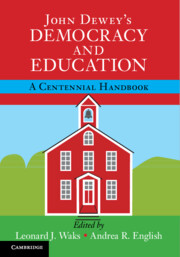Book contents
- John Dewey’s Democracy and Education
- John Dewey’s Democracy and Education
- Copyright page
- Contents
- Contributors
- Foreword
- Acknowledgments
- Note on Abbreviations
- Introduction
- Part I Companion Chapters
- Introduction to Part I
- 1 Learning by Doing and Communicating
- 2 Learning and Its Environments
- 3 Giving Form and Structure to Experience
- 4 Growth, Habits, and Plasticity in Education
- 5 Democracy without Telos: Education for a Future Uncertain
- 6 What Is the Role of the Past in Education?
- 7 “A Mode of Associated Living”: The Distinctiveness of Deweyan Democracy
- 8 A Democratic Theory of Aims
- 9 What Is the Purpose of Education?: Dewey’s Challenge to His Contemporaries
- 10 Shaping and Sharing Democratic Aims: Reconstructing Interest and Discipline
- 11 Experience and Thinking: Transforming our Perspective on Learning
- 12 The Role of Thinking in Education: Why Dewey Still Raises the Bar on Educators
- 13 Method: Intelligent Engagement with Subject Matter
- 14 Subject Matter: Combining “Learning by Doing” with Past Collective Experience
- 15 Work, Play, and Learning
- 16 Boundaries as Limits and Possibilities
- 17 Knowing Scientifically Is Essential for Democratic Society
- 18 Educational Values: Schools as Cultures of Imagination, Growth, and Fulfillment
- 19 The Value of the Present: Rethinking Labor and Leisure through Education
- 20 An Old Story: Dewey’s Account of the Opposition between the Intellectual and the Practical
- 21 Nature and Human Life in an Education for Democracy
- 22 Individuality and a Flourishing Society: A Reciprocal Relationship
- 23 Autonomy, Occupation, and Vocational Education
- 24 Philosophy of Education
- 25 Healing Splits: Dewey’s Theory of Knowing
- 26 The Consciously Growing and Refreshing Life
- Part II Democracy and Education in Context
- Index of Names
- References
6 - What Is the Role of the Past in Education?
On Chapter 6: Education as Conservative and Progressive
from Part I - Companion Chapters
Published online by Cambridge University Press: 20 April 2017
- John Dewey’s Democracy and Education
- John Dewey’s Democracy and Education
- Copyright page
- Contents
- Contributors
- Foreword
- Acknowledgments
- Note on Abbreviations
- Introduction
- Part I Companion Chapters
- Introduction to Part I
- 1 Learning by Doing and Communicating
- 2 Learning and Its Environments
- 3 Giving Form and Structure to Experience
- 4 Growth, Habits, and Plasticity in Education
- 5 Democracy without Telos: Education for a Future Uncertain
- 6 What Is the Role of the Past in Education?
- 7 “A Mode of Associated Living”: The Distinctiveness of Deweyan Democracy
- 8 A Democratic Theory of Aims
- 9 What Is the Purpose of Education?: Dewey’s Challenge to His Contemporaries
- 10 Shaping and Sharing Democratic Aims: Reconstructing Interest and Discipline
- 11 Experience and Thinking: Transforming our Perspective on Learning
- 12 The Role of Thinking in Education: Why Dewey Still Raises the Bar on Educators
- 13 Method: Intelligent Engagement with Subject Matter
- 14 Subject Matter: Combining “Learning by Doing” with Past Collective Experience
- 15 Work, Play, and Learning
- 16 Boundaries as Limits and Possibilities
- 17 Knowing Scientifically Is Essential for Democratic Society
- 18 Educational Values: Schools as Cultures of Imagination, Growth, and Fulfillment
- 19 The Value of the Present: Rethinking Labor and Leisure through Education
- 20 An Old Story: Dewey’s Account of the Opposition between the Intellectual and the Practical
- 21 Nature and Human Life in an Education for Democracy
- 22 Individuality and a Flourishing Society: A Reciprocal Relationship
- 23 Autonomy, Occupation, and Vocational Education
- 24 Philosophy of Education
- 25 Healing Splits: Dewey’s Theory of Knowing
- 26 The Consciously Growing and Refreshing Life
- Part II Democracy and Education in Context
- Index of Names
- References
- Type
- Chapter
- Information
- John Dewey's Democracy and EducationA Centennial Handbook, pp. 54 - 63Publisher: Cambridge University PressPrint publication year: 2017



